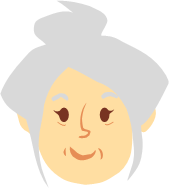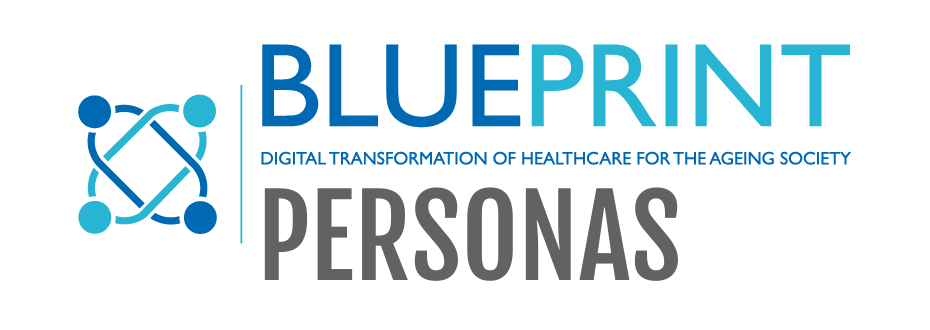Teresa

Name
Teresa
Age
83
Country
Portugal
Area
urban
Life course
person aged 80+
Need
Generally well / good wellbeing
Connectivity
broadband, smart phone
Teresa and her 87-year old husband are living in a 3rd floor small apartment with no lift in Porto city. She attends classes at a university of the third age and likes participating in social Porto city initiatives. Her husband, who leads a more passive life, has several long-term (chronic) conditions and is becoming more dependent on her. Teresa is increasingly having difficulties taking care of him and while she is concerned about her husband’s health and dependence on her, she would also like to keep leading an active life herself. She is also starting to think about them moving to another, more accessible apartment since climbing the stairs is becoming more and more challenging for her.
Internet usage
Mobile device skills
Affinity to new tech
Digital Health Literacy
Assistance (ICT use)
What's important to Teresa
– Walking in the public garden near her home everyday.
– Going to classes 3 times a week; knitting.
– Being independent.
– Husband‘s health; being able to rely on son for support.
– Going to classes 3 times a week; knitting.
– Being independent.
– Husband‘s health; being able to rely on son for support.
Health concerns
– She occasionally has joint pain.
– Climbing the stairs is becoming more challenging for her.
– Climbing the stairs is becoming more challenging for her.
Daily living
– Bathes and dresses herself and her husband.
– Goes to a small supermarket and chats with the owner.
– Spends most of the day outside doing things.
– Speaks with their grandchildren via Skype regularly.
– Goes to a small supermarket and chats with the owner.
– Spends most of the day outside doing things.
– Speaks with their grandchildren via Skype regularly.
Health tests
– Routine tests: blood cell counts; lipid profile, glucose, renal and hepatic functions, TSH (Thyroid stimulating hormone).
– Blood pressure checks.
– Electrocardiogram (ECG).
– Bone Densitometry (measures bone density).
– Blood pressure checks.
– Electrocardiogram (ECG).
– Bone Densitometry (measures bone density).
Events, issues & personal concerns
– Being alone, getting sick, and becoming dependent.
– Being unable to use the stairs and leave the apartment.
– Security at home and outside.
– The process of having to one day move out.
– Being unable to use the stairs and leave the apartment.
– Security at home and outside.
– The process of having to one day move out.
Treatment: medications, therapies, etc.
– Calcium supplements.
– Vitamin D supplements.
– Occasional painkillers for joint pain.
– Vitamin D supplements.
– Occasional painkillers for joint pain.
Own resources & assets / support
– Son lives 2km away; they have lunch together everyday.
– Regular doctor (GP) appointments.
– Well-established local network.
– Practical problem solver, follows her GP’s recommendations.
– Housekeeper 5 half-days/ week.
– Regular doctor (GP) appointments.
– Well-established local network.
– Practical problem solver, follows her GP’s recommendations.
– Housekeeper 5 half-days/ week.
Care professional concerns
– Her husband’s physical dependence is increasing and he has difficulties going with her to medical appointments.
– Worried about her husband‘s health; his multiple conditions require him to take more than 5 medicines/day.
– Would prefer her husband to continue living at home over him moving into a nursing home.
– Worried about her husband‘s health; his multiple conditions require him to take more than 5 medicines/day.
– Would prefer her husband to continue living at home over him moving into a nursing home.
Needs
– Teresa is increasingly having a difficult time taking care of her husband (e.g. his hygiene) and looking after their apartment.
– Teresa’s husband is socially isolated because he is not active; meanwhile Teresa, his carer, enjoys leading an active life and therefore tends to spend more time out of the home.
– Teresa does not want her joint pain to prevent her from leading an active life. She wants to find an easy and painless way of moving about, climbing the stairs in her building and elsewhere. She is thinking of them both moving to a more accessible apartment in their neighbourhood.
– Teresa and her husband will need social care support upon decreased mobility and when her husband becomes even more dependent on her.
– Teresa’s husband is socially isolated because he is not active; meanwhile Teresa, his carer, enjoys leading an active life and therefore tends to spend more time out of the home.
– Teresa does not want her joint pain to prevent her from leading an active life. She wants to find an easy and painless way of moving about, climbing the stairs in her building and elsewhere. She is thinking of them both moving to a more accessible apartment in their neighbourhood.
– Teresa and her husband will need social care support upon decreased mobility and when her husband becomes even more dependent on her.
